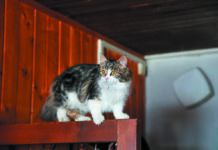

© Hannadarzy | Dreamstime.com
Q I wonder if you could give me any suggestions regarding my 10-year-old cat Ringling’s behavior. We lost our 22-year-old Siamese a month ago, who was Ringling’s lifelong friend. Ever since he died, Ringling has gotten very clingy and vocal, following me around, continually begging to be petted and held. She seems to need constant attention and reassurance. She has also thrown up several times in the last weeks, something she has not done before.
We have another cat who would like to be friends with her, but she has never liked him and won’t let him come near her. I think she is missing our old kitty — as am I — but I would like her to detach a bit from me. I would greatly appreciate any ideas you may have for me to help Ringling through this.
Lois Espeland
A Dear Lois: Poor Ringling! It certainly sounds like she is grieving the loss of a close companion and friend (“preferred associate” in technical terms). It can take a few months — sometimes longer — for cats to mourn the loss of a close companion. Let me share some thoughts about how to help Ringling through this difficult time.
It is important to rule out medical causes of behavior change. Medical problems can cause cats to become clingy and more vocal. Especially since you report vomiting, Ringling should be seen by her veterinarian.
Increasing environmental enrichment for Ringling will promote independence and help to lift Ringing’s mood. I suspect that Ringling relied on her friend for entertainment as well as companionship. Without her, she will have to learn to entertain herself in her environment.
Adding new features in her life may attract her attention and help her to engage. A new window seat with a bird feeder nearby can help give her other things to think about. Puzzle feeders provide mental stimulation for indoor cats. My favorite is the Pipolino, but there are many others. New places and things to explore may help as well.
Cat tunnels can be purchased and hidey holes can be made of paper bags or cardboard boxes. Toys should be rotated daily so that they stay interesting. Many cats appreciate a fish tank (with a tightly sealable lid!) to watch. Outside time with a halter and leash can also provide interest. Many cats appreciate cat grass.
Regular play can definitely help. Exercise increases serotonin, which decreases anxiety and lifts mood. About 15 minutes per day of aerobic predatory play with a fishing toy is usually enough.
Training can also help decrease the anxiety that arose from the big change in Ringling’s environment with the loss of her companion. I recommend clicker training for cats. It is enjoyable and builds communication between her and her owner.
And as far as her relationship with your other cat, the best approach would be to begin to associate very special treats when they are in each other’s presence. If there is active hostility between them, a separation and reintroduction program should be done. I hope that this helps!
Stephanie Borns-Weil, DVM
Clinical Instructor
Cummings School of Veterinary Medicine at Tufts University




